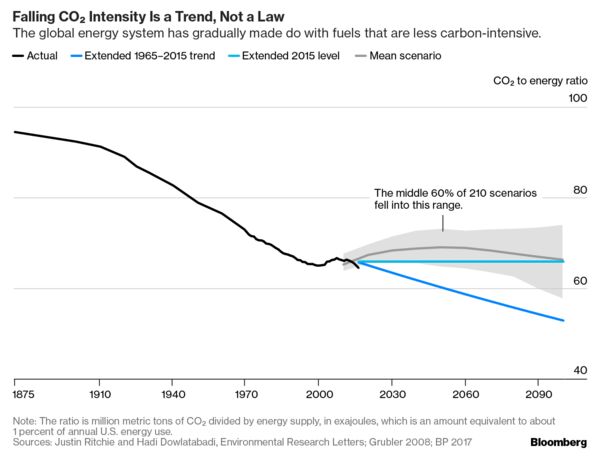I read it this way: the faux environmentalists are starting to walk back their wild claims that anthropogenic global warming will mean the end of earth as we know it.
Probably not going to happen, though this was predicted in 2008 or thereabouts:
It's behind a paywall, but if you don't subscribe to Bloomberg you should be able to access it by googling key phrases from the article.
Link here.
The beginning of the article:
There are some 20,000 research papers listed on Google Scholar, a search engine for academics, that mention the worst-case scenario for climate change, one where an overpopulated, technology-poor world digs up all the coal it can find. Basically, it’s the most cataclysmic estimate of global warming.
This scenario is important to scientists. It focuses minds on the unthinkable and how to avoid it.
According to a provocative new analysis from the University of British Columbia, it’s also wrong.The scientific reference:
The new work, published this week in Environmental Research Letters, shows just how much all that phantom coal may be distorting our picture of what the future may look like. It casts “doubt on whether this outlook is still valid,” the researchers write.
The worst-case scenario is one of four siblings. Their names, from bad to worst, are RCP2.6, RCP4.5, RCP6.0 and RCP8.5. They were introduced in 2011 as a way for researchers running different climate-economic models to do comparable studies regarding how high greenhouse gas concentrations might rise by 2100.
These four storylines range from a 2100 in which aggressive global climate policy leads to low warming, to one in which humanity digs up and burns anything that’ll catch fire.
One big problem with the amount of coal burning assumed by RCP8.5 is that there’s probably not enough extractable coal to make the scenario possible. “We don’t think it’s going to happen,” said Justin Ritchie, lead author of the University of British Columbia study and a Ph.D. candidate. “That’s extremely unlikely and also inconsistent with every year since the late 19th century.” [Best example of faux environmentalists walking back their most extreme predictions.]A key graphic:

More from the article:
The 2015 Paris Agreement called for limiting warming to from 1.5 degrees to 2 degrees Celsius (3.6 degrees Fahrenheit). Global average temperatures have already risen almost 1C in the past century. The 1.5C goal may already be impossible, and 2C would require major emissions reductions and, later this century, technological advances to pull enough carbon out of the air.
The disconnect between the historical decarbonization trend and the demands of RCP8.5 shed light on the often-ignored foundation of the world’s climate goals: the baseline.
Paying attention to climate goals without studying optimal baselines is like watching the end of a marathon without knowing where or when it started.The article is quite long; it's a must read (if you can get to it).
